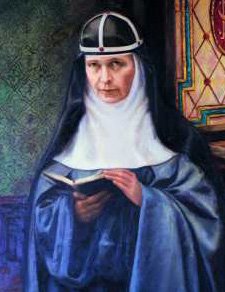
Jane Frances Fremyot was born to a noble family in the year 1572. Unfortunately for the infant Jane her mother died very young and so it was left to her father, Benigne to raise her alongside her other siblings. Though, Jane's mother died so tragically her Father raised all his children with a devout love for their Faith, and so he instructed his children diligently with sound Church Teachings from a very young age.
Jane lived a typical life for a lady of her peerage and soon caught the eye of many notable young men of the region, but a marriage for Jane was arranged by her father to the very suitable Baron Christopher de Chantal in 1592.
Being that her husband worked at the royal court this left Jane to raise their children and to also care for their estate, which she did with great common sense. But Jane did not spend her time in managing her home or socialising she also encouraged all her servants to attend daily Mass alongside her and also undertook to help the poor in her region. She also instructed her cook to serve anyone who came to her door looking for food and that none must be turned away for as she said, "Who was she to turn away God's creatures?"
But tragedy intervened when Jane's husband Christopher was killed during a shooting accident, which left Jane alone to bring up her children and care for their estate on her own. The sorrow of losing her husband was a defining moment for Jane as lost in her grief she would walk for miles and would also go riding to try and escape her sense of deep grief. There seemed nothing anyone could do to help her during this difficult time as Jane mourned her beloved husband.
So God instead took direct action in the life of this faithful woman when He allowed her to receive a vision and in this vision she saw a Priest and then Jane heard these words, "This is the man beloved of God and among men into whose hands you are to commit your conscience." Jane was at first perplexed at such a statement and a little in awe that something like this could happen to one as humble as herself.
But upon hearing these words Jane decided to take a vow of chastity for the remainder of her life. And as she searched for new meaning in her life and a new direction Jane also read books on the spiritual life to help guide her in the direction upon which God wished for her to take.
Jane would also find herself not free from personal trouble as her grieving Father in Law demanded that she and her children come to live with him as he threatened to disinherit her and her children if Jane disobeyed him! For the death of his beloved son had left her father in law feeling embittered and angry at just about everyone! Jane did not wish to harm her children’s inheritance so she did as her father in law had bid and left to live in his home at his estate in Monthelon. But life was not the same for Jane and she could not recapture the domestic bliss she had once enjoyed with her beloved husband. Things were not made easier by having to endure the envy of the housekeeper and the enmity of her father in law, but through all this Jane looked towards God and grew strong in her Faith.
But Jane was steely in matters of Faith and so continued to go to daily Mass and practice the corporal works of mercy to the needy. She also taught her children and also the members of staff who had children the Faith, which had given her such strength to endure the unendurable. And her compassion for the poor and sick also reached out to the lepers who she allowed to attend Mass though at a distance, for Jane recognise that all were in need of God's assistance most especially the despised in society.
This love that Jane had for the poor was inherent in her very being, she did not give to the poor from feelings of sentimentality but because she recognised Jesus in the suffering. Even though Jane had been raised in fine conditions and had a retinue to maids and cooks to look after her, still Jane’s heart was with the poor to help them in a practical sense.
But it would be in 1604 that Jane's life would change forever never to be the same, as she was encouraged by her father in law to hear a Priest deliver the Lenten sermons in the Dijon region. The sermons were given by the Bishop of Annecy, namely Bishop Francis de Sales. For when the young Bishop stepped out it was here that Jane recognised the Priest she had seen in her vision, she was awestruck! And it was here that a life long spiritual friendship would be forged between two souls who were in love with God. Bishop Francis then became Jane de Chantal’s spiritual director, what a privilege and an honour as both of these great Saints lived to fulfil God's Will in their lives. As Francis de Sales wrote to Jane about their friendship, "I think that God gave me to you; every hour makes me more sure of it; that is all I can say. Commend me to your guardian angel." And so began this Holy friendship between two God fearing souls.
It was also during this time that Jane felt a strong call to live a Religious life and she shared this ideal with Francis who commended her on her vocation but also cautioned to be patient as her children still needed her attention at home. But the calling that Jane felt never left her so she prayed to God so that she would always do His Will and not her own and also under guidance from Bishop Francis, Jane waited patiently.
So it was in 1607 that Jane told her family of her decision to enter the Religious life, while her family objected strongly Jane under the guidance of her friend and spiritual director Bishop Francis held firm, though it was difficult for her to endure. But Francis also explained to Jane's family that the Order she would join would not be cloistered but would work amongst the poor and sick. But it was in 1610 that Jane along with several other women began to live the spirituality of her and Bishop Francis Order of the Visitation of Our Lady, which would become known as the Salesians in time.
The friendship that was founded between Francis de Sales and Jane de Chantal lasted for the rest of his life and Jane was deeply saddened at the death of her saintly friend, more sorrow was to follow with the death of her daughter and grandchild as well as her brother. During these difficulties Jane met with another holy man of God by the name of Vincent de Paul, they too forged a lasting friendship, as Jane continued to live out the spirituality of the Salesians.
Jane under the direction of Vincent de Paul lived as a Religious with other lay women of her time, but in time the Visitation Order would become more contemplative while still providing for poor women and the education of the poverty stricken.
The Order began by Saint Francis de Sales and Saint Jane de Chantal is still thriving to this day.
Jane de Chantal died in 1641.
Saint Jane de Chantal was Canonized in 1767 by Pope Clement XIII.
Some Quotes
"Hold your eyes on God and leave the doing to him. That is all the doing you have to worry about."
"We should go to prayer with deep humility and an awareness of our nothingness. We must invoke the help of the Holy Spirit and that of our good angel, and then remain still in God's presence, full of faith that he is more in us than we are in ourselves."
"There is no danger if our prayer is without words or reflection because the good success of prayer depended neither on words nor on study. It depends upon the simple raising of our minds to God, and the more simple and stripped of feeling it is, the surer it is."
"We must never dwell on our sins during prayer. Regarding our offences, a simple humbling of our soul before God, without a thought of this offence or that, is enough...such thoughts act as distractions."
Peace of Christ to ALL
Copyright © 2006 Marie Smith. All rights reserved.






